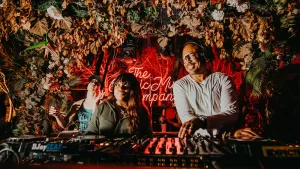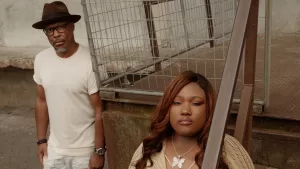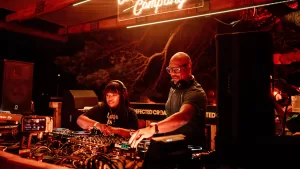
Robert and Lyric Hood make house that’s clear in its sanctified intentions — but whatever your beliefs, the music that the father-and-daughter duo create as Floorplan is some of the most joyous club material you’re likely to hear. Their new album, ‘The Master’s Plan’, came out on Classic Music Company last month, and Bruce Tantum caught up with the duo to find out more
On Saturday evening at this year’s edition of the Movement festival, a silhouetted pair of figures, one towering over the other, strode along the Pyramid Stage, nestled next to the Detroit River. Stepping up to the decks, they charged through a high-powered session of gospel-tinged house stompers, spinning cuts like ‘Save Me’ by Adelphi Music Factory and the Mason Flint remix of Wh0’s ‘The Power’, along with a slew of previously unheard tunes. The raucous crowd, already revved up from a full day of dancing, was in rapture; the set was as much revival meeting as it was DJ set.
The hour-and-a-half journey into joy came courtesy of Floorplan, the father-daughter duo of Motor City techno royalty Robert Hood and his daughter, Lyric. The Hoods moved to Alabama 20 years ago, but both Robert and Lyric, who was just seven when the family headed south, are still firmly rooted in the Motor City. “Movement is always a special occasion, a homecoming,” Robert tells DJ Mag a few days after the Movement madness. “It’s just magical to play in my hometown, and it’s great seeing all the old Detroit guys too.”
He rattles off a list of Detroit contemporaries with whom he reconnected while at Movement: Delano Smith, Norm Talley, Mike “Agent X” Clark, Waajeed (“and his mom!” Robert adds), Carl Craig…
“We even had my cousin there,” chimes Lyric, who’s also on the call.
“And a friend who also I hadn’t seen since I was probably, man, 15 years old,” Robert adds. “It’s just magical to play there. Starting out in Detroit, growing up there, traveling the world, and coming back home to play — you feel like you’ve come full circle.”
“I still call Detroit my home,” Lyric adds.
As it turns out, many of the new tracks from their set were from ‘The Master’s Plan’, Floorplan’s fourth full-length and the third to feature Lyric as a member. Released on Luke Solomon’s Classic Music Company, the album wends through a foot-stomping path of house motifs, with Robert and Lyric’s gospel inclinations at its core. Robert describes it succinctly: “It’s a spiritual album,” he says.

Robert Hood boasts a profoundly influential musical biography. As the ’80s slid into the ’90s, the Detroit native, a core member of the city’s second wave of DJs and producers, teamed up with Jeff Mills and “Mad” Mike Banks as part of the techno collective Underground Resistance; on his own, he presaged the concept of minimal techno with the 1994 LP ‘Minimal Nation’. Over the years since, he’s crafted a solo discography of machine-age tracks that vary in feel from mathematically precise to atmospherically meditative. He’s widely regarded as one of the foundational pillars of modern electronic club music as we know it today.
Floorplan emerged in 1996 as a solo side project with the release of the ‘Funky Souls’ EP. The moniker was set aside for Robert’s more house-oriented excursions, with chunkier rhythms, rounded bass tones, rich chords, and a liberal use of vocal samples. An ordained minister since 2009, his devoutly Christian leanings became manifest in his music with the release of cuts like 2011’s piano banger ‘We Magnify His Name’. Those inclinations have played a significant role in Floorplan’s music ever since.
Lyric’s role in the Floorplan story began in the mid-’10s, when the home-schooled teenager was about to celebrate a birthday. “I’ve always been used to the music life and the club life,” Lyric says, “because it was in the house all the time. Then, on my 16th birthday, my parents asked me what type of entertainment I wanted. I said I had to think about it — then my parents came back to me and said, ‘Well, why don’t you try and DJ?’” Her dad showed her the ropes.
“And she did it, and it was amazing,” he says.
From there, Lyric’s involvement grew organically. A DJ set at her church, her first “real” gig, was a success — “it was awesome,” Robert recalls — and she also proved a quick learner on the production front.
“Bringing Lyric in was a brainstorm between my wife and I,” Robert says. “We were just kind of talking with each other — ‘Hey, wouldn’t it be funny if Lyric joined Floorplan?’ And we laughed about it. And then — ‘Well, what if that actually happened? Wouldn’t that be great?’”
By 2016, with the release of the ‘Victorious’ LP on Robert’s M-Plant label, Lyric was a full partner in the Floorplan project, credited as co-writer and co-producer.
“Floorplan had been dormant for a while,” Robert says, “and Lyric joining Floorplan, it was a process of rebirth.”
In the years since, Robert has often credited Lyric with expanding his vision and helping to change his ideas of what club music from Detroit could be. “My approach was very much rooted and grounded in techno and minimal music,” he says, “and listening to Lyric’s ideas and discussing her thoughts about house music, and listening to what she liked to DJ — it just broadened my thought pattern on how Floorplan can really express itself, not by leaving techno but by taking elements of techno and fusing it with house music. It’s sort of like a soup, where the stock is house music and the seasoning is a little bit of minimal, a little bit of techno and a little bit of disco. Lyric’s ideas let me evolve as a producer, and I knew that if Lyric liked a certain sound, that was going to be the future. She refocused me, in a sense.”
To hear him tell it, Floorplan, in some sense, is more Lyric’s project than his own. “I told her, ‘Lyric, you find all the tracks for our DJ sets’, and she’s done an awesome job,” he says. “And since she’s been producing, I’ve been like, ‘OK, you just steer the bus!’”
Lyric’s proven herself an adept solo artist on her own via a slew of propulsive house releases on M-Plant; Robert, of course, still has his own solo career, one that last year took a jazz-tech left turn via a collaboration with Femi Kuti called ‘Variations’, before returning to something closer to straight-up techno with the recent ‘Alpha Key’ EP.

For now, the focus is on ‘The Master’s Plan’, and Lyric’s ideas of what house can be could account for the record’s sweep. There are plenty of piano-led bangers, of course — but among its other flavours, there’s also New Jersey / Baltimore–style house (the Dames Brown–voiced ‘Give Us Your Light’), disco-kissed material (‘What You Need’), music seemingly purpose-made for festival season (‘Flashe No Deux’) and swingy minimalism (‘Like Dat’).
“We started in January of last year, just experimenting,” Lyric says. “We weren’t sure what we were going to do for the album at first, so we prayed about it and sat down as a family and said, ‘OK, what are the steps that we’re going to take?’”
“We were like, ‘what do we want to achieve with this?’ We don’t want to get set into a box of Floorplan is just about this, or just about that,” Robert adds. “We wanted to expand on the fusion concept of what Floorplan is about. It started off as techno with gospel — but we wanted to exhibit our disco side and our house side, and fuse that all together.”
In addition to Dames Brown, the album features vocal contributions from Lowell Pye (a former member of the gospel group Men Of Standard) and Earthtone (aka Robert’s wife, Eunice). All are from the Motor City, but one of the album’s highlights, ‘Fake & Unholy’, features a non-Detroiter — Honey Dijon. The sinewy cut is essentially a spoken-word monologue on the value of expressing one’s true self, set to a Jersey club-esque kick: “Let us strive to be real, honest, and genuine… we don’t have to be fake and unholy.”
Though Honey and the Hoods are Classic labelmates, and though they are all house music traditionalists in their own ways, the teaming still might seem a bit unlikely. But to hear the Hoods tell it, it was a natural fit — and another of Lyric’s ideas of what the album should be.
“I had told my dad, ‘Honey Dijon is somebody that we definitely, definitely have to have,’” she says. “And when it began to fall together, everything was just right. The vocals, the music, it all fit together perfectly.”
“It was imperative to get Honey, let me tell you,” Robert says. “We’ve long admired Honey as a DJ, an artist, and just as a force in house music — and music, period. It just made sense. We could see her vision so well. Honey is very particular, in a good way, and so are we. She knew exactly what she wanted, so we stopped at nothing to try to get this track to where it’s a track that Honey would want to play herself.”
‘Fake & Unholy’ is a transcendent track in its own secular fashion, but most of ‘The Master’s Plan’ hews closer to a Sunday-morning-in-church variety via its bevy of samples of praise – lyrics like “rejoice in the feeling that comes from above” (from ‘Give Us Your Light’) – and all-round vibe. To further clarify its intention, the album opens with Eunice’s voice intoning, “Welcome to WGOD, live from Detroit Radio.”
“I’ve grown up in the church, and we always talk about how Floorplan should be able to minister to people through music,” Lyric says. “We’ve always wanted to have a sermon through our music, and our DJ sets as well.”
“Floorplan gives us an opportunity to share God’s message with the world, and it’s just a simple message: ‘For God so loved the world, that he gave his only begotten son, that whosoever believeth in him should not perish, but have everlasting life.’” (He delivers that quote, John 3:16, with a preacher’s cadence.) “That’s the message we want to spread, and it’s imperative that we share that message, even now, more than ever, with all this happening in the world.”
“And we have had people come up to us and say, ‘Thank you for your music. It has blessed me,’” Lyric adds. “Or ‘It has helped me change my ways.’”

Within Floorplan, Robert and Lyric view each other as co-producers — but there’s no escaping that it’s a father-daughter relationship as well, and in the interview, Lyric tends to defer to her dad. Though she’s now an adult, you can’t help but wonder how Robert feels about leading his daughter to clubland, which, as we all know, can be a pretty wild place. True to his role as a minister, he sees himself as his daughter’s shepherd.
“You know, the world is filled with iniquity,” he says. “It’s in the workplace; it’s in the government; it’s in the police force; it’s in church. Lyric’s going to see lots of crazy things in this world. My job as her father has been to help guide her through all of this.”
Nightlife people, of course, often aren’t looking for an overtly religious experience, at least in the traditional sense. It’s a world that could even drive certain ministers to despair, but Robert, who’s been at this for ages, is fully cognizant of his chosen milieu — yet he still feels that his music can have the desired effect, at least obliquely. At one point, the analogy between clubbing and churchgoing, a concept which came of age during the Paradise Garage days, comes up in the conversation — and he thinks back to his own early experiences.
“The Paradise Garage, or the Warehouse in Chicago… I’ve never been to any of those clubs and got to experience what they were feeling,” he says. “But having my own experience at Heaven, in Detroit, with the legendary DJ Ken Collier — that euphoric experience was sort of like Sunday morning. Everybody was moving as one. I remember the closing night of the Music Institute. Derrick May, D-Wynn, Blake Baxter — it was amazing to feel everybody moving together, and that’s what that feeling is when the Holy Spirit sweeps through the congregation, and everybody is on one accord. When that break hits, when that climax hits, everybody is feeling the same thing, and you look at each other like, ‘What is happening? The roof just came off, and we left Earth and went somewhere else’. That’s church, man! There’s nothing like it when there’s a praise break in church, and the Holy Spirit hits, and you hear that mother in the back crying out, and everybody’s doing their Holy Ghost dance and clapping their hands, and it calms down for a little bit and then the drummer will start hitting it again and the organ player comes back up — that’s…”
“Raw emotion,” Lyric suggests.
“Yes,” Robert agrees, “that’s it! A raw, spiritual, supernatural emotion that just hits the soul.”
That’s what club music, at its best, is all about — and Floorplan does it better than just about anyone, whatever one’s beliefs.






Leave A Comment
You must be logged in to post a comment.